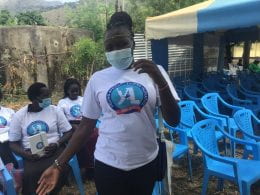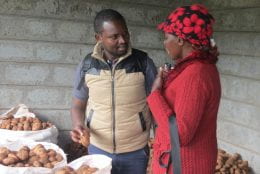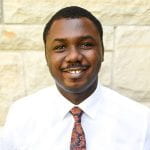If women’s empowerment entails having access to power, making decisions about one’s life, and having control over resources, Africa has made tremendous progress. For example, Africa leads the world when it comes to women’s participation and representation in politics. Women make up 61 percent of Rwanda’s parliament, Namibia (46%), South Africa (43%), and Senegal (42%). At 27 percent, Africa is also home to the highest number of women entrepreneurs. However, despite these numbers, there is still a long way to go to achieve gender equality in Africa.
In Africa, 40 percent of young girls get married before the age of 18. Let me reframe that: grown men in Africa force 40 percent of our young girls into marriage before turning 18. The consequence, among other things, is that these girls are less likely than their male counterparts to complete their education, making them less likely to be qualified for high-paying jobs. Only 8 percent of girls finish secondary (high) school in sub-Saharan Africa. With very few women completing their education, most are relegated to the informal economy. These women struggle to make a living by working as street vendors and in factories without any protection from the government; they have no health insurance and are paid poorly. Gender inequality can also be seen in who has access and control of land. While women produce 80 percent of the food grown in Africa, only 15 percent are landowners.
In this article, we highlight the work that three 2021 Mandela Washington Fellows are doing to reduce gender inequality in Africa. Women’s rights are human rights. The Staley School is proud to support the development of these young leaders working to reduce gender inequality in Africa.
Viola Sang (2021 Fellowship Alumna, Kenya)

In Kenya, over 4.1 million women live below the poverty line, defined as surviving under $1.90 per day. These numbers keep rising. Viola Sang believes that extreme poverty and lack of access to economic opportunities are some of the biggest challenges facing women in Kenya today. These challenges are made worse by gender-based violence, including rape, physical violence, sexual harassment, harmful cultural practices, and traditions such as female genital mutilation practices by most nomadic communities in Kenya. Added to this is the problem of early marriages, which deprives young girls of education. In many communities in Kenya, Viola said that women do not have the right to own land. Very few have access to credit and other financial services, making it difficult for them to thrive economically.
Viola is a passionate advocate for women’s and girls’ rights. She hails from a rural community called Elgeyo Marakwet county in Kenya. Having witnessed the extreme poverty and gender inequality facing women in her community, she founded KEYMAR CBO to empower women both socially and economically through organized groups. Viola organizes the women in her community into groups, teaches them financial literacy, and creates a platform for table banking and saving. Table banking is an informal banking system where women in the group save their money and give loans to members to support their businesses without security.
 Viola also organizes workshops in her community to teach young girls about their rights and help them develop essential skills to generate income. Since 2014, Viola has empowered over 3000 women and girls to be self-reliant. Many of these women now own businesses, resulting in increased household income and improved standard of living. As regards what more needs to be done to reduce gender inequality in her community, Viola said, “there is a need to develop more economic empowerment programs that directly target the most vulnerable minority women with financial support and other inputs to help them start or improve businesses and increase their financial independence. Government and other agencies should also allocate resources to organizations serving minority and indigenous groups for civic education on gender equity, with particular emphasis on provisions addressing gender equality, the rights of marginalized groups, and land rights.”
Viola also organizes workshops in her community to teach young girls about their rights and help them develop essential skills to generate income. Since 2014, Viola has empowered over 3000 women and girls to be self-reliant. Many of these women now own businesses, resulting in increased household income and improved standard of living. As regards what more needs to be done to reduce gender inequality in her community, Viola said, “there is a need to develop more economic empowerment programs that directly target the most vulnerable minority women with financial support and other inputs to help them start or improve businesses and increase their financial independence. Government and other agencies should also allocate resources to organizations serving minority and indigenous groups for civic education on gender equity, with particular emphasis on provisions addressing gender equality, the rights of marginalized groups, and land rights.”
Atija Assane (2021 Fellowship Alumna, Mozambique)
The material cost of gender inequality is well documented. Globally, it is estimated that the loss of human capital wealth due to gender inequality sits at $160 trillion. There is also a relationship between gender inequality and violence against women. Violence against women is both the cause and consequence of gender inequality. This is why the work of Atija Assane is so crucial.
Atija is a social activist from Mozambique passionate about reducing gender inequality, focusing on violence against women. In Mozambique, one in three women are victims of gender-based violence. Atija asserts that this problem is made worse by weak laws and institutions in her country that fail to protect women. She said, “While we have these laws on paper, they are not effective; they are rarely enforced. The abuse of women is a daily occurrence, and we live in a country where women’s basic rights are still publicly violated. There is no indication that our government is ready to face this problem.” One example of such a poorly enforced law is the criminalization of underage marriage. The Mozambican parliament passed a law that criminalized the marriage of girls under 18, yet, today, Mozambique has one of the highest rates of underage marriage in the world, with almost half of girls in Mozambique marrying before the age of 18. Atija opines that this blatant disregard for laws protecting women and the lack of political will to enforce these laws are a reflection of the “total disrespect for women in Mozambique.”
As an artist, Atija uses storytelling, body performances, and artistic installations to share personal experiences of women who have suffered violence and abuse. She also designs and implements campaigns that challenge colonial and patriarchal practices that oppress women. She believes that there is a need for safe spaces in Mozambique where women can provide peer support and share their experiences. These spaces can help breed revolutionary movements that continue to challenge systems that oppress women. More importantly, Atija believes that the government must take violence against women seriously by strengthening institutions designed to protect women and enforcing existing laws that hold men accountable.
Simon Nyaga Wanjiru (2021 Fellowship Alumnus, Kenya)

Simon Nyaga Wanjiru is another young leader working to empower women in Kenya. Simon is the founder of Bold Impact Africa. Since 2017, Bold Impact Africa has empowered women in agriculture, health, finance, and education. Like Viola, Simon agrees that the biggest challenge facing women in Kenya is oppressive laws and norms that prevent women from owning land and other resources. He also mentioned early marriage and lack of access to quality education as challenges his organization aims to address. One way they do this is by training women on Agricultural production. They provide women with resources such as seedlings, farming equipment, and market information to generate income and become self-sustaining.
 Speaking on the impact of these interventions, Simon said, “The income women get from selling Agri-produce is used to buy other households’ needs and support their children to go to school. Three thousand four hundred women have been empowered, and our target is to empower 10,000 needy women by the year 2022 and 50,000 by 2024.”
Speaking on the impact of these interventions, Simon said, “The income women get from selling Agri-produce is used to buy other households’ needs and support their children to go to school. Three thousand four hundred women have been empowered, and our target is to empower 10,000 needy women by the year 2022 and 50,000 by 2024.”
Simon is also committed to helping young girls in his community gain access to education. So far, he has worked with other stakeholders to secure scholarships for 52 girls. He also mobilizes his community to generate funds that provide these young girls with sanitary pads to ensure they do not miss school during their menstrual periods. Viola and Simon are doing vital work to reduce gender inequality in Kenya.
The Mandela Washington Fellowship is a program of the U.S. Department of State with funding provided by the U.S. Government and administered by IREX. For more information about the Mandela Washington Fellowship, visit mandelawashingtonfellowship.org.
 Onyedikachi Ekwerike, Ph.D., is a 2017 Mandela Washington Fellowship Alumnus, a graduate of the K-State Leadership Communication doctoral program, and the author of blog posts highlighting the 2021 Fellows.
Onyedikachi Ekwerike, Ph.D., is a 2017 Mandela Washington Fellowship Alumnus, a graduate of the K-State Leadership Communication doctoral program, and the author of blog posts highlighting the 2021 Fellows.


 Viola also organizes workshops in her community to teach young girls about their rights and help them develop essential skills to generate income. Since 2014, Viola has empowered over 3000 women and girls to be self-reliant. Many of these women now own businesses, resulting in increased household income and improved standard of living. As regards what more needs to be done to reduce gender inequality in her community, Viola said, “there is a need to develop more economic empowerment programs that directly target the most vulnerable minority women with financial support and other inputs to help them start or improve businesses and increase their financial independence. Government and other agencies should also allocate resources to organizations serving minority and indigenous groups for civic education on gender equity, with particular emphasis on provisions addressing gender equality, the rights of marginalized groups, and land rights.”
Viola also organizes workshops in her community to teach young girls about their rights and help them develop essential skills to generate income. Since 2014, Viola has empowered over 3000 women and girls to be self-reliant. Many of these women now own businesses, resulting in increased household income and improved standard of living. As regards what more needs to be done to reduce gender inequality in her community, Viola said, “there is a need to develop more economic empowerment programs that directly target the most vulnerable minority women with financial support and other inputs to help them start or improve businesses and increase their financial independence. Government and other agencies should also allocate resources to organizations serving minority and indigenous groups for civic education on gender equity, with particular emphasis on provisions addressing gender equality, the rights of marginalized groups, and land rights.”
 Speaking on the impact of these interventions, Simon said, “The income women get from selling Agri-produce is used to buy other households’ needs and support their children to go to school. Three thousand four hundred women have been empowered, and our target is to empower 10,000 needy women by the year 2022 and 50,000 by 2024.”
Speaking on the impact of these interventions, Simon said, “The income women get from selling Agri-produce is used to buy other households’ needs and support their children to go to school. Three thousand four hundred women have been empowered, and our target is to empower 10,000 needy women by the year 2022 and 50,000 by 2024.” Onyedikachi Ekwerike, Ph.D., is a 2017 Mandela Washington Fellowship Alumnus, a graduate of the K-State Leadership Communication doctoral program, and the author of blog posts highlighting the 2021 Fellows.
Onyedikachi Ekwerike, Ph.D., is a 2017 Mandela Washington Fellowship Alumnus, a graduate of the K-State Leadership Communication doctoral program, and the author of blog posts highlighting the 2021 Fellows.
 Gloria Majiga-Kamoto, a 2019 Mandela Washington Fellow at Kansas State University, recently received the 2021 Goldman Environmental Prize for her work implementing Malawi’s ban on thin plastics. Her journey began in Malawi when a program for farmers that provided goats to them began to see rising deaths caused by goats eating plastic bags leftover from roadside snacks.
Gloria Majiga-Kamoto, a 2019 Mandela Washington Fellow at Kansas State University, recently received the 2021 Goldman Environmental Prize for her work implementing Malawi’s ban on thin plastics. Her journey began in Malawi when a program for farmers that provided goats to them began to see rising deaths caused by goats eating plastic bags leftover from roadside snacks. As part of K-State’s land-grant mission, the Leadership Communication program is dedicated to research that strengthens Kansas and global communities. The program seeks to create bold, community-engaged scholarship that advances the public good. Answering to a call from various industries, government, and non-governmental organizations (NGOs), Leadership Communication doctoral students pursue research on leading change, engaging community, and advancing communication. Because of these focus areas, the program attracts widely diverse students with divergent career goals. Graduates of this program will use community-engaged research to transform the academic, nonprofit, government, private and civic sectors in which they live and work.
As part of K-State’s land-grant mission, the Leadership Communication program is dedicated to research that strengthens Kansas and global communities. The program seeks to create bold, community-engaged scholarship that advances the public good. Answering to a call from various industries, government, and non-governmental organizations (NGOs), Leadership Communication doctoral students pursue research on leading change, engaging community, and advancing communication. Because of these focus areas, the program attracts widely diverse students with divergent career goals. Graduates of this program will use community-engaged research to transform the academic, nonprofit, government, private and civic sectors in which they live and work.